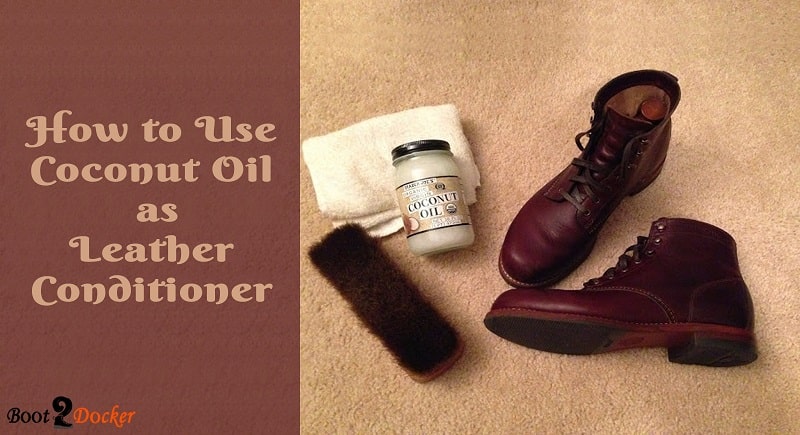How to Use Coconut Oil as Leather Conditioner
by Jason Flores
Leather is a versatile material used to make various things like shoes, coats, couches, and other items. Maybe you have heard that coconut oil is used for faux leather and leather conditioning. Coconut oil will help your leather look smoother for a while, and it will take out the cracks in your leather.
Coconut oil is an excellent conditioner for faux leather and leather materials. It would be best to use a dry and clean cloth to buff the oil on the leather surface. Since coconut oil hardens during cold weather, you might have to warm it up when you want to use it. During application, too, it would be best if you applied only one thin coat to prevent the material from hardening.
The amazing part about using coconut oil to condition your leather products is that there are chances you might already have coconut oil in your home. You do not have to look for any special leather conditioning products that cannot be used in another way, unlike coconut oil. Below is more information about using coconut oil as a leather conditioner, including darkens and waterproof leather.
Contents

Why you should condition leather
There are several reasons why you should condition leather. The primary thing that any leather conditioner will do to your leather products is cleaning them. The conditioners are made of chemicals that will infiltrate any grime or dirt on the product and then get rid of it.
Everything gathers grime and dirt over time, and so does leather. Leather can be a dirt magnet because of its composition. Luckily enough, you can clean grime and dirt using a proper conditioner.
Leather conditioners also help in preserving your leather products. Leather is a smooth and comfortable product. However, if you do not maintain it well and neglect it, it will become rigid and hard. To prevent the deterioration of the state of your leather, you should apply a conditioner to the leather regularly. This way, you will be preserving the material, and it will remain in good condition for a long time.
In addition to that, conditioning your leather strengthens it. Applying conditioner to your leather products strengthens it, which in turn improves its quality. The chemicals found in the conditioners bind the leather together, making it stronger and more durable than before. Using conditioner on your leather jackets and boots would be a smart move because it would guarantee you durability and strength for the years to come.
Some leather items like leather seats are always exposed to sunlight for a significant period. Much like how exposure to sunlight damages your skin, so will it damage untreated leather. Leather conditioners have anti-UV properties which block out any harmful UV radiation emitted from the sun. When leather absorbs the radiation, it becomes rigid and hard to form a sunblock for the weather.
If you see to it that you have conditioned your leather seats at least once in a while, you will find it easy to manage the quality of your seats for some time.
A leather conditioner will also moisturize your leather products. If you gently rub the conditioner on your leather products with a microfiber rag, you will be restoring dryness and cracks. The leather will absorb the moisture like a plant soaking up the water you poured on it. This should last you a few minutes.
Is coconut oil a good option for conditioning leather?

To prevent the leather from cracking and to make it softer and restore its shine, you have to condition it. Since leather conditioning products might be relatively expensive and hard to find; you can use coconut oil, which will serve the same purpose. Even if it is not the best oil for conditioning your leather, it is highly convenient.
Before using coconut oil on your leather furniture or clothing, there are several things you should consider. When left at temperatures below 76 degrees, coconut oil hardens. This makes it hard for you to apply the same on your leather since most houses are at temperatures cooler than 76 degrees.
To get rid of this hardness, you will have to heat the coconut oil to a melting point but ensure it is not hot during application. Even if coconut oil is a good leather conditioner, you should not use just any oil on your leather. You would want to avoid any oil that is sticky or heavy.
Sticky and heavy oils will settle in the fibers and pored of the fiber causing permanent damage. They will create a cast of oil on the leather, making it hard to take it off. Oils that are absorbed instantly and non-sticky ones should be your go-to. If they leave behind some shines, the better.
Oils like mink oil and coconut oil are good leather conditioners. Below are some of the features you should be on the lookout for when choosing leather conditioners.
- Waterproofing- Besides giving your leather some shine, you should ensure the substance you use to condition your leather has waterproof qualities against perspiration stains, snow salt, and water. Even if coconut oil does not need to waterproof your leather permanently, it will provide a thin layer for a few days.
- Conditioning- the oil you use to condition your leather should be highly effective in that it can provide conditioning on your leather surfaces for a long period. You should ensure you choose a leather conditioner from a reputable dealer, so read reviews and ask for recommendations.
- Non-toxic and natural blend oils- toxic and chemical blends can destroy the natural fibers of leather and decrease its lifespan. With this said, you should go for oils with a natural blend.
- Non-sticky and lightweight- the conditioning oil you use should be non-sticky and light-textured. If you go for heavy and sticky oils, they will be drenched in the leather and never come off hence ruining your leather completely.
How to use coconut oil as a leather conditioner
When using coconut oil as a leather conditioner, ensure you do not apply huge amounts on the cloth you will use to condition with. If you use large amounts of coconut oil, you will find it hard to spread it evenly on the surface, leading to spottiness. Also, applying a lot of coconut oil makes it form a residue once it cools, after which it hardens.
To ensure the leather you are conditioning absorbed the coconut oil before hardening, you can place it near a heating vent or any other warm air source. Regardless of the type of oil you are using, the process of conditioning leather using oil is always the same. Below is the procedure for using coconut oil as a leather conditioner.
- Place a pea-sized amount of oil in a container.
- Use a sponge or cloth to dab the oil and rub the leather in a circular motion.
- When you start applying the oil, it will look spotty and will darken temporarily. This will be inky last for a short period and will be gone after a while.
Does coconut oil make leather dark?
Just like other oils, coconut oil will darken the oil. But, leather products are known to darken over time after exposure to light naturally. If you want to condition your leather, but you do not want it to darken, then coconut oil should not be your leather conditioner. If you do not want your leather to darken, look for leather conditioning products labeled as non-darkening leather conditioners.
Does coconut oil make leather waterproof?
Conditioning leather with coconut oil makes it get a thin layer of waterproof protection, but in most cases, the thin layer does not last for long. If you are conditioning leather boots using coconut oil, you can expect them to be waterproof for a day or two; not longer than that.
All types of water are repellent to water, but the thin layer coconut oil provides in leather does not provide long-lasting waterproof protection. If you want to make your leather waterproof, use waterproof leather wax or mink oil.
What is the best oil for leather?
Petroleum-based oils are inferior to natural oils. Mink oil and neatsfoot are the most common oils used in conditioning leather. Since they are natural fats, they are somewhat similar to leather fibers. If you want to restore the shining of your leather, neatsfoot oils are your best option. Mink oil, on the other hand, will make your leather look duller instead of shiny.
Neatsfoot oil will also darken your leather and be harmful if your couch's stitching absorbs it. If you want to soften and make your leather waterproof, go for mink oil.
Final Thoughts
Any oil can be applied to leather as a conditioner and produce the expected results, and so can coconut oil. It would be best if you tried to restore the shine of your couch or boots and soften it. You should not use petroleum-based oils to condition your leather, but instead, you should use natural fat like coconut oil to condition your leather.
 |
 |
 |
 |

About Jason Flores
Jason Flores is a multi-talented individual whose unique journey has led him to blend his passion for craftsmanship and fashion into a creative endeavor. During his formative years, he found himself immersed in the world of handiwork, spending countless hours in his grandfather's workshop. These early experiences allowed him to develop a deep understanding of practical skills and a keen eye for detail.
Simultaneously, Jason harbored an innate love for fashion, drawn to the artistry and self-expression it offers. As he grew older, he recognized the potential to combine his proficiency in craftsmanship with his fashion sensibilities. This realization led him to a path where he began to explore and write about the intersection of fieldwork fashion.
Thoughts on "How to Use Coconut Oil as Leather Conditioner"
 |
 |
 |
 |
Get FREE Boots Gifts now. Or latest free toolsets from our best collections.
Disable Ad block to get all the secrets. Once done, hit any button below
 |
 |
 |
 |